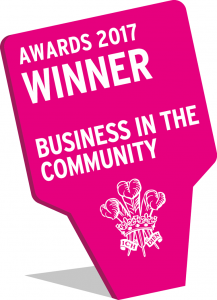 SolarAid is proud to announce that our social enterprise, SunnyMoney, has won the Unilever Global Development Award at the 2017 Responsible Business Awards.
SolarAid is proud to announce that our social enterprise, SunnyMoney, has won the Unilever Global Development Award at the 2017 Responsible Business Awards.
The Awards Gala took place at the Royal Albert Hall last night and was presented by broadcasters Jeremy Vine and Emily Maitlis. It celebrated the hundreds of inspiring businesses who entered the awards and who make a difference by taking action to build more inclusive workplaces, stronger communities and address global challenges such as sustainability.
Jeremy Leggett, Founder and Chairman of SolarAid, which owns SunnyMoney said:
“We are deeply grateful to BITC and Unilever for this honour. We receive it in deep gratitude to all our many and varied stakeholders who made it possible. To the SolarAid supporters who fund SunnyMoney, we thank you for the trust you place in us. To our teams in the field, present and past, we thank you for your passion, which the SolarAid London team see every time we visit SunnyMoney operations. To our colleagues in Solarcentury, we thank you for all your brilliant work, which helps us so much via the 5% of annual profits you donate to us. To our colleagues in Yingli Green Energy, we thank you for the thrilling daily experience of our partnership, and the hopes we share for the solar lighting products we are developing.
But we receive this award in extreme humility. Because the fact is that we consider that we, and indeed the rest of the global community, have failed to date to make much of a dent in the huge problem we exist to defeat. Fully 1.2 billion people still languish without electricity in our world today, many of them forced to use lethal, polluting, and expensive kerosene. The global solar lighting industry has only sold some 30 million quality-verified solar lights, anywhere, ever. Yet a solar light can cost as little as $5 and last 3-5 years, while kerosene in contrast costs nearly $80 every year, in the areas where we work. And then there are the carbon savings. Some companies have an internal cost of CO2 that is in double or even triple digits USD, yet a $5 solar light costs us $5 to deliver for sale, and it offsets fully one tonne of carbon dioxide.
And, notwithstanding these beyond-no-brainer economics, in dollars and tonnes, global sales of solar lights actually fell in 2016. How can the global community, with all our focus on Global Development Goals, explain our collective failure, in the face of the enormous savings we could unlock for the poorest of the poor? There are people and organisations involved in these awards who could eradicate the use of kerosene for lighting within a matter of years if we worked together with seriousness of intent. We very much hope to be to working with you in new alliances, with renewed determination, in the year ahead.”
NOTES FOR EDITORS:
1. The scale of the problem Solarcentury and SolarAid seek to address. More than one billion people live without access to grid electricity, 640 million of them in Africa. Yet, despite the hugely favourable economics of solar lights, fewer than 30 million quality-verified products have ever been sold, globally (nearly 2 million of them by SolarAid’s retail brand SunnyMoney). Jeremy Leggett views this as one of the biggest failures of global collective responsibility in the field of development.
2. Solarcentury offers an integrated end-to-end solar service: developing, structuring finance, building and operating solar projects at commercial and utility scales. The company works with partners to bring solar to their customers’ homes, and is committed to making solar more accessible and attractive, via its own BIPV (building integrated PV) products or investment into storage and diesel hybrid. Solarcentury’s business is global and growing, with offices in the UK, the Netherlands, Kenya, South Africa, Chile, Panama and Mexico, and representation in Germany, France and Spain. To date the company has deployed over 780 megawatts, built on more than 1,000 sites across the world. It has helped over 25,000 homeowners realise the benefits of going solar.
3. SolarAid has the mission of eradicating the kerosene lamp from Africa, and views the imperatives for and benefits of doing this as a microcosm for the wider replacement of fossil fuels by clean energy across society. The charity’s wholly-owned retail brand SunnyMoney catalysed the first two solar African solar lighting markets, selling over a million solar lights between 2013 and 2015 in Kenya and Tanzania. Currently it is trying to repeat this feat in Uganda, Malawi and Zambia. SolarAid has twice been shortlisted for the Zayed Prize, and SunnyMoney is currently shortlisted for the Business In The Community / Unilever Global Development Award.